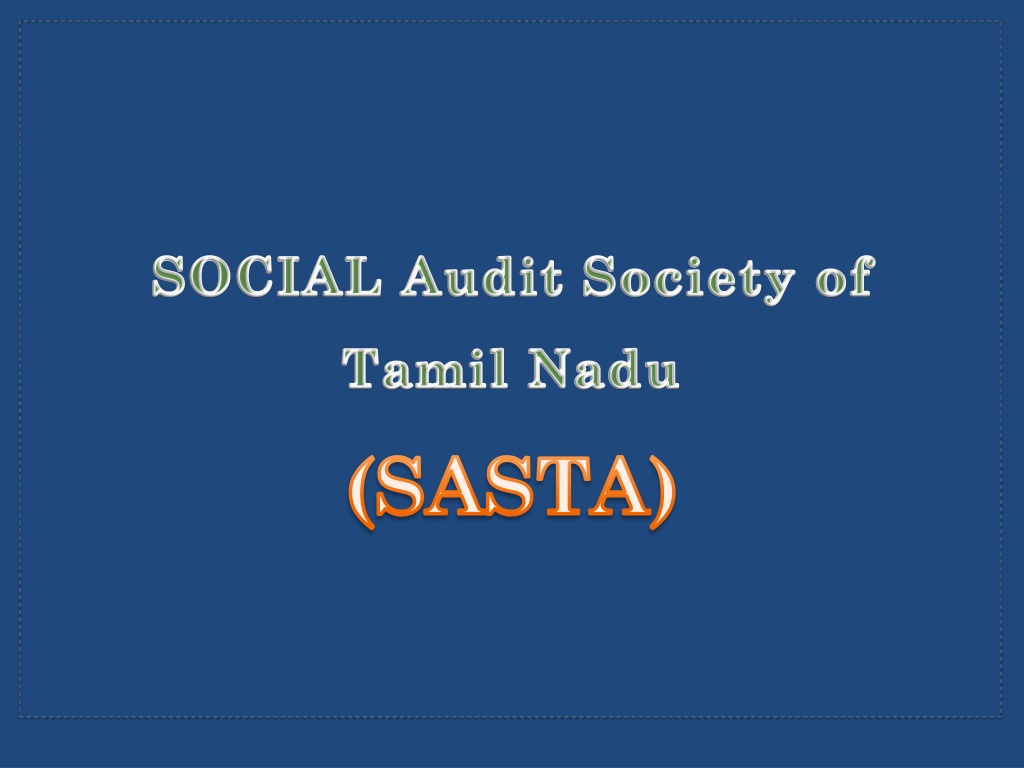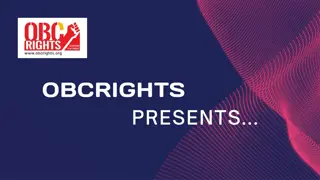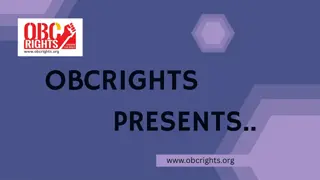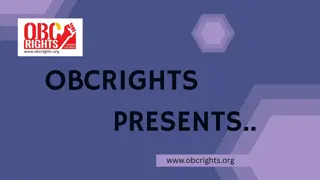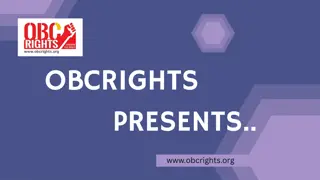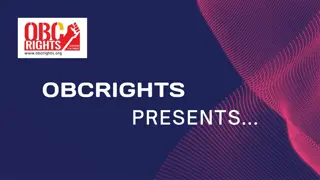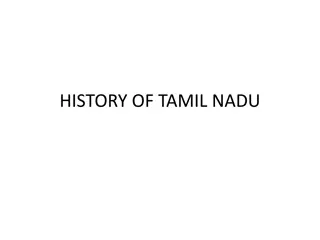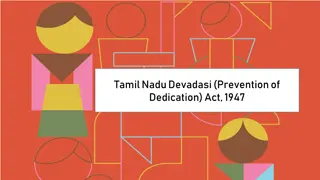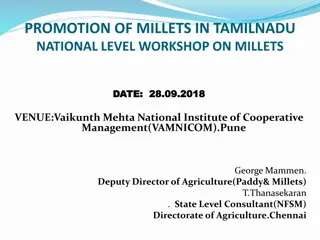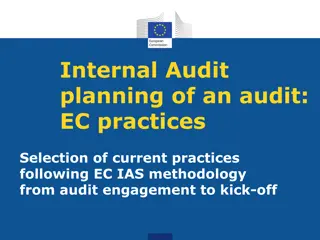Overview of Social Audit Society of Tamil Nadu (SASTA)
The Social Audit Society of Tamil Nadu (SASTA) was established in 2012 with the aim of promoting transparency and accountability in governance. Since its inception, SASTA has focused on recruitment, training, and capacity building initiatives for staff and stakeholders involved in social audit processes. Emphasizing the importance of NGO partnerships, SASTA has worked on enhancing the skills and knowledge of Village Panchayat members through various training programs. The society's efforts have been guided by a dedicated governing body and a commitment to adhere to established tender rules and procedures in its operations.
Download Presentation

Please find below an Image/Link to download the presentation.
The content on the website is provided AS IS for your information and personal use only. It may not be sold, licensed, or shared on other websites without obtaining consent from the author. Download presentation by click this link. If you encounter any issues during the download, it is possible that the publisher has removed the file from their server.
E N D
Presentation Transcript
SOCIAL Audit Society of Tamil Nadu (SASTA)
ESTABLISHMENT G.O. No. 64 dated 27.7.2012 - Social Audit Society of Tamil Nadu established Director, 2 JDs and 1 AD appointed from RD & PR Deptt., G.O. No. 125 dated 21.12.2012 Approval of bye-laws for SASTA 09.01.2013 Registration of the Society
1stGoverning Body Meeting (Feb. 2013) Important items in Agenda: Creation of Additional office staff Budget for 2013-14 Process for hiring DRPs & BRPs Training plan Selection of NGOs for imparting Training Revised pay structure for contract staff Pattern for conduct of Social Audit
RECRUITMENT OF STAFF 3 SLMs, Office Staff and 1 SAS appointed Committee appointed by Governing Body to monitor recruitment process T.N. Transparency in Tender Rules, 2000 followed National-level newspaper advertisements, inviting H.R. agencies to apply for recruitment of staff T&M Services consulting Pvt Ltd, Mumbai, appointed as HR agency For including retired staff were received DRP, BRP and supporting staff, 12,984 applications Written test in 9 centres for fresh applicants retired exempted from written tests Interview for DRP in Chennai and BRP in 5 centres
TRAINING & CAPACITY BUILDING ON SOCIAL AUDIT 4 ToTs organised for APOs, BDOs and External Resource Persons Village Panchayat Secretaries (12,524) sensitised through one day programmes Panchayat Presidents (12,524) and Village RD&PR officials (11,660) imparted orientation training 5 days intensive training for District Resource Persons 5 days intensive training for Block Resource Persons 1 lakh PRI elected representatives sensitised through 5 RIRDs
EMPANELMENT OF NGOS NGOs as Training & Support Organisations Committee set up to superintend empanelment of NGOs T.N. Transparency in Tender Rules, 2000 followed Expression of Interest released in newspapers followed by Technical bid To train 1,00,000 Village Panchayat Ward Members and 62,620 Village Panchayat assemble primary stake-holders at worksites and educate them on their Rights & Entitlements Resource Persons and to However, 2ndGoverning Body resolved to entrust the training with 5 RIRDs and training is in progress
SOCIAL AUDIT IS: 1. Education an IEC tool 2. Accountability a transparency tool a grievance redressal tool a corruption deterrent tool 3. Mobilization a participation promotion tool a gram sabha strengthening tool an empowerment tool A Social Justice tool 4. Feedback Is a tool to give valuable inputs to implementing agency about systemic issues
CONDUCT OF SOCIAL AUDITS 19 Model Social Audits (one Village Panchayat each in 19 districts at random) conducted initially (prior to staff recruitment) 1,000 Social Audits conducted from November 2014 Around 25-50 workers selected at Block level Minimum educational qualification: 8thstd worked at least 25 days in MGNREGA in the last Financial Year Selected Village Social Audit Facilitators are given intensive training at the Block office on Registers, Records, Online data, Records Verification, Field Evaluation, Report Preparation and Presentation
SOCIAL AUDIT PROCESS I. Pre Audit : Day 1 Create awareness on Social Audit & Recruit Village Social Audit Facilitators in habitations MGNREGS worksites and Day 2 Assemble the people interested in becoming facilitators for a classroom session on MGNREGS & Social Audit followed by a simple screening test and finally select 5 VSAFs per Panchayat Day 3 Training for the selected VSAFs
SOCIAL AUDIT PROCESS II. Conduct of Audit: Day 1: Collection of records & Verification. Habitation meetings for awareness Days 2 & 3: Household visits with muster rolls and online data on days worked and wages earned verification of job cards and interaction with MGNREGS workers Day 4: Worksite visit and verification of quantity & quality of works Day 5: Compilation of findings and preparation of Social Audit report Day 6: Conduct of Social Audit Gram Sabha Presentation of report, discussions, testimonies, official response and a Grama Sabha resolution
MAJOR FINDINGS OF SOCIAL AUDIT Voice of the people: Low wages Inability to get work when they need it Delayed wage payment Issues with bank payments Worksite facilities not provided Not able to get job cards Old people, women with children discouraged No grievance redressal system
MAJOR FINDINGS OF SOCIAL AUDIT CONTD Poor quality of work and poor asset creation poor planning, poor selection of works & poor monitoring. Quantity not commensurate with the wages disbursed Registers not maintained properly/no updations Incomplete and wrong data in mgnrega.nic.in Significant fake entries & overwriting in Job Cards, NMR, etc., Discrepancies between Job Cards, Muster Rolls, Registers and Online data Technical staff not visiting worksites Poor documentation M books not maintained well, no photos in the Asset Register and no Completion Repport
EFFECTS OF SOCIAL AUDIT Greater awareness among workers on MGNREGA and their rights Well attended Grama Sabha Improvement in maintenance of records and online data entry Dedicated staff proposed
DIFFICULTIES IN THE CONDUCT OF SOCIAL AUDIT Social Audit viewed as a trouble maker as it brings out serious issues, hitherto hidden and so, resisted Accountability mechanisms are poor and system unable to respond to the issues pointed out in Social Audit Reluctance of Implementing Agencies to give the records In some places, PRI Representatives and local officials actively work against the Social Audit process Protest by officials and engineers, but work ethic has improved Conduct of Grama Sabha, ATR, Follow-up, etc.,
FEEDBACK Issue 1: Low wages (second lowest in the country) Work culture needs to improve IEC activity to be done (film screening of good works, pamphlets of works) Training to do earthwork efficiently Tools of stakeholders blunt and unproductive Wage determination to be in a transparent manner Management structure Dedicated staff strength is too low Worksite management should improve with the training for worksite supervisors
FEEDBACK - 2 Issue 2: Lack of work (average days/working HH varies from 76 in Trichy to 35 in Nilgiris) Need to capture work demand or do data analysis and address the issue pro-actively Issue 3: Need to improve quality of assets Gram Sabha needs technical and administrative help in selecting works Ensure optimum output in the execution To facilitate convergence projects (a mechanism involving high level officers needs to be set up) Issue 4: Transparency and Monitoring Do wall paintings Initiate concurrent audit by reconstituting panchayat level VMC
FEEDBACK - 3 Issue 5: Address the grievances Need for a good independent grievance redressal system Ombudsman system to be publicized and strengthened (maybe unresolved complaints should go to him) Issue 6: MGNREGA data Need to fix issues with data entry Need to enter as much data as possible Need to redesign Panchayat levels which were designed during the pre EFMS era Need to give wage information to the workers Physical Registers at Block &
ROADMAP Conduct 500 Social Audits in March 2015 Fill-up the vacancies among DRPs & BRPs Cover all the Village Panchayats once during 2015-2016 Create a comprehensive database of the Village Social Auditors Standardisation of the Reporting Formats Computerisation of the findings
